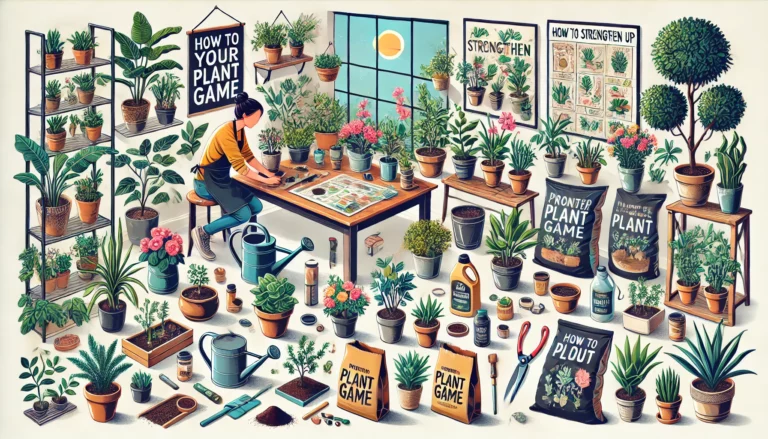Introduction
Whether you’re a seasoned gardener or a beginner, there’s always room to strengthen your plant game. Enhancing your gardening skills involves understanding plant needs, implementing effective care practices, and staying updated with the latest gardening techniques. This guide will give essential tips and strategies to elevate your gardening prowess and ensure thriving, healthy plants.
Understanding Plant Needs
To strengthen your plant game, it’s crucial to understand the fundamental needs of plants. It includes light, water, nutrients, and the right growing conditions.
Light Requirements
Different plants have varying light needs. Understanding these requirements helps you place your plants in optimal locations.
Types of Light
- Full Sun: Plants typically need at least six hours of direct sunlight daily.
- Partial Shade: Plants thrive with three to six hours of direct sunlight or filtered light.
- Shade: Plants grow best with less than three hours of direct sunlight.
Watering Practices
Proper watering is essential for plant health. Overwatering and underwatering can both lead to plant stress and disease.
Watering Tips
- Check Soil Moisture: Use your fingers to check the soil moisture before watering. Water when the top inch of soil is dry.
- Water Deeply: Water deeply and thoroughly to encourage profound root growth.
- Avoid Wet Foliage: Water the soil directly to prevent fungal diseases from wet foliage.
Soil Health and Fertility
Healthy soil is the base of successful gardening. Improving soil health ensures your plants receive the nutrients they need.
Soil Testing
Sort out a soil test to determine the pH and nutrient levels. Adjust the soil with amendments like lime or sulfur to correct pH and compost or organic fertilizers to boost nutrients.
Organic Matter
Integrate organic matter such as compost, aged manure, or leaf mould to improve soil structure, fertility, and moisture retention.
Plant Selection and Diversity
Choosing the right plants for your climate and garden conditions is critical to a thriving garden. Plant diversity also helps create a balanced ecosystem.
Native Plants
Go for native plants that are well-adapted to your climate and soil environment. They require less maintenance and are more resistant to local pests and diseases.
Companion Planting
Practice companion planting to enhance plant growth and deter pests. For example, planting marigolds with tomatoes can repel nematodes and other pests.
Implementing Sustainable Practices
Sustainable gardening practices benefit both your garden and the environment. They promote healthy plant growth while conserving resources.
Mulching
Mulch your garden to retain moisture, kill weeds, and regulate soil temperature. Use organic mulches like straw, wood chips, or leaves.
Water Conservation
Implement water-saving techniques such as drip irrigation, soaker hoses, and rain barrels. These methods ensure efficient water use and reduce waste.
Organic Pest Control
Use natural pest control methods to manage garden pests. Beneficial insects, homemade sprays, and organic products can control pests without harmful chemicals.
Staying Updated with Gardening Trends
Gardening is an ever-evolving field. Staying updated with the newest trends and techniques can help you improve your plant game.
Gardening Blogs and Forums
Follow gardening blogs and join online forums to exchange tips and learn from other gardeners’ experiences.
Gardening Workshops
Attend local gardening workshops and classes to gain hands-on experience and knowledge from experts.
Regular Monitoring and Maintenance
Steady monitoring and maintenance are crucial for a healthy garden. Systematically check your plants for signs of stress, disease, or pests.
Pruning
Prune your plants to eliminate dead or diseased branches, promote healthy growth, and shape the plant.
Fertilizing
Encourage your plants with organic fertilizers to provide basic nutrients. Follow a regular feeding diary based on the specific needs of each plant.
Weed Control
Keep weeds under control by regularly weeding your garden. Mulching and using landscape fabric can help prevent weed growth.
Conclusion
Strengthening your plant game involves understanding plant needs, improving soil health, selecting the right plants, and implementing sustainable practices. By staying updated with the latest gardening trends and regularly monitoring and maintaining your garden, you can make sure your plants thrive and your garden flourishes. Enhance your gardening skills today. Furthermore, enjoy the rewards of a vibrant, healthy garden.
- Growing Bonsai: Tips for Miniature Tree Enthusiasts
- Buying Bonsai: Tips for Selecting Your Perfect Tree
- Bonsai Potting: Essential Tips for Tree Care Success
- Bonsai Maintenance: Essential Care for Tiny Trees
- Mastering the Art of Shaping Bonsai: A Beginner’s Guide
source: How To Strengthen Up Your Plant Game


